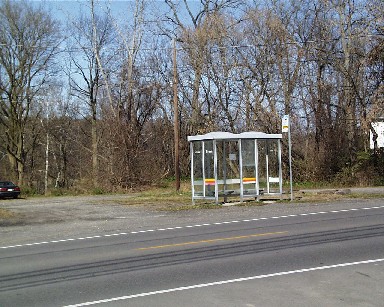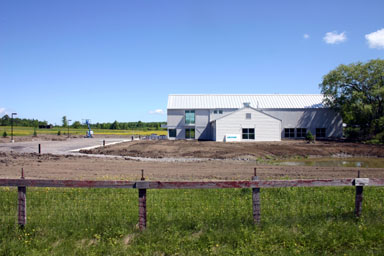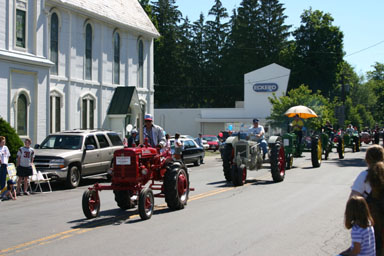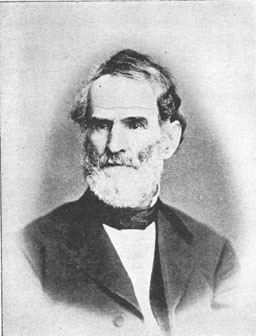June 1, 2004
Alumni dinner, creek training
Catching up on yesterday's Ithaca Journal, there was an announcement for the Dryden Central School District all-year reunion dinner, which will be on Saturday, June 12th, at the McLean Fire Station. Festivities start at 4pm, with dinner at 6pm.
Today's paper notes training for volunteers monitoring Six Mile Creek, to be held from 10am to noon on Saturday, June 5th at the Caroline Town Hall (map). The Town of Dryden is participating in that project.
Jury selection has begun in the case of the November robbery at the Song Tao restaurant in the Village of Dryden.
Finally, David R. Lee, a Town of Dryden resident newly elected to the Ithaca school board, responds in detail to Vic Anand's earlier complaints about what he gets for his taxes here compared to his previous home in Virginia.
Varna Auto and Inn
West of the Varna Community Center and a few houses, Varna Auto and the Varna Inn share 933 Dryden Road.
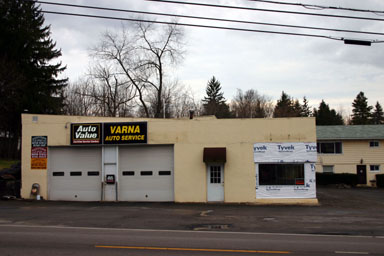
933 Dryden Road, Varna Auto (map)
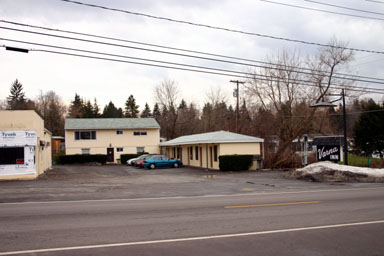
933 Dryden Road, Varna Inn (map)
Across the way is a bus stop.
And then two houses.
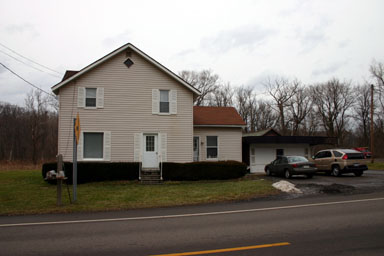
928 Dryden Road (map)
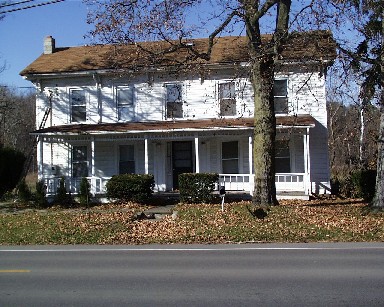
922 Dryden Road (map)
June 2, 2004
Dryden legislators split on assessments
Today's Journal reports that the County Legislature voted 9-5 against a proposal for a public hearing on shifting to a three-year assessment cycle put forward by Dryden County Legislator Mike Lane. Lane voted for it, while the other two legislators representing Dryden - Martha Robertson and George Totman - voted against it. Thomas Todd's proposal to put the Republican proposal for a County Executive on the November ballot as a referendum was sent to committee.
The Journal's editorial for today also looks at county legislative matters, quoting Martha Robertson while encouraging the development of a discount prescription drug card for the county.
This week's Our Towns section includes a profile of the Freeville Fire Department, a Neighbors section filled with Dryden people, and a list of upcoming events that includes the Dryden schools reunion dinner June 12th, the Elm Tree Stump Run on June 6th, the Varna United Methodist Church barbecue on June 5th, and Dryden Dairy Days on June 12th. A story on the restoration of a house across the Groton line in McLean gives me some hope for similar old houses in Dryden.
There's also another statistical tidbit, this one on employment. It shows 68.24% of Dryden's 6555 people over 16 are in the civilian work force, while 28.69% aren't in the labor force at all, and 3.02% are unemployed. 0.05% are listed as working for the armed forces. Once again, I'm curious how these numbers are derived, as the paper just cites Claritas.
The Journal also notes that the Tompkins County Democratic Committee endorsed incumbent Assemblywoman Barbara Lifton for her current seat and Jeff Miller of New Hartford as a challenger to Sherwood Boehlert in the Congressional race.
June 3, 2004
Dryden school budget, TC3 criminal justice
Today's Ithaca Journal reports on last night's budget-cutting at the Dryden School Board meeting, as the Board tries to modify their budget for a second round of voting after the original budget failed on a 718-718 tie vote.
The article includes a long list of items being cut, and the Journal's editorial today warns about what contigency budgets will look like. (Commentator David Rossie sarcastically suggests that school boards should take the same budget approach as the state, as legislators seem to keep getting re-elected, but somehow that doesn't seem practical.)
In brighter news, TC3 is adding an A.S. degree in criminal justice, complementing its existing A.A.S. program with a program aimed at students who want to transfer to a four-year institution for further work.
June 4, 2004
Guilty plea in robbery; school testing results
Today's Ithaca Journal reports that one of the three men accused of robbing the Song Tao restaurant in Dryden in last November, Cam B. Quan, has pleaded guilty to first-degree burglary. Two other accomplices, also from Texas, have not yet gone to trial.
In schools news, test scores for elementary and middle school English weren't encouraging for local school districts, with Dryden falling about 10 percent on both the fourth and eighth grade tests while Ithaca varied by school. The state doesn't seem to have posted the actual scores on their web site yet. All I could find was a press release with a link to a PowerPoint presentation which doesn't break anything down for districts beyond the biggest five in the state.
Dryden school budget changes, children among the eskers
This week's Dryden Courier looks at the Dryden School District's challenge in assembling a new budget after the 718-718 tie. Some challenges the board has to face:
- a 15% increase in gas prices since January
- a 14% increase in health premiums this year, on top of 19% last year
- retirement expenses increasing while investment returns diminish
- a decline in state aid from 60% of the district budget to 50%
Particularly strange to me was a comment from a 'no' voter that said to fix the sidewalks. From a 'yes' voter that might have been helpful, but I'm not entirely sure what resources the district is supposed to find to fix them.
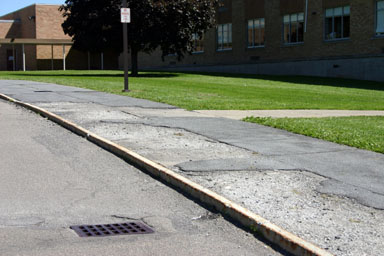
Crumbling sidewalk at Dryden High School.
If the revised budget fails, a contingency budget will take effect for the first time since 1998.
In brighter news, Cassavant Elementary School students went to visit the the Nature Conservancy's O.D. Von Engeln Preserve, wandering among the eskers, kames and kettles while Dryden High Seniors greeted them as fairytale characters.
There's also a piece on the continuing question of whether mountain lions are returning to the area, though it doesn't discuss Dryden in particular.
SPCA expansion nearing completion
Signs are going up and the landscaping looks less like a construction site than it did back in March.
June 5, 2004
Dryden budget, IDA, Sodom and Gomorrah
Today's Ithaca Journal takes a close look at the numbers in the revised Dryden school budget, which will increase the tax rate from $21.92/$1000 to $22.56, a 3.39% rate increase. The tax levy increases 10.69%, though spending increases only 7.11%.
There's also a story on delay in state approval for borrowing Empire Zone acreage from Schuyler County, including some discussion of Dryden County Legislator Mike Lane's proposal for an industrial park.
On the opinion page, Darts & Laurels contains two laurels from Dryden residents. The first, from Richard Jorgensen of Freeville, thanks Bob Romanowski for an earlier letter about "our local colony of socialists", adding his own barb that "f Ithaca is an enlightened city, represented by those three [Luster, Joseph, and Wilcox], then Sodom and Gomorrah were church camps." The second, from Russ Kowalski, thanks residents for electing him to the school board.
June 6, 2004
Town meetings in June
The Town of Dryden has updated their public notices page for June.
- The Zoning Board of Appeals met already this week, Tuesday, June 1st at 7:30 pm.
- The Recreation Commission is meeting on Monday, June 7th at 6:00 pm, at the Recreation Department Office (map). Use the back entrance.
- The Conservation Advisory Board is meeting Tuesday, June 8th, at 7:30 pm. (They're still looking for two new members.)
- The Town Board is meeting at 7:00pm on Thursday, June 10th. The full agenda hasn't been posted yet, but the notices page lists the two public hearings, both of which affect the area where Routes 13 and 366 overlap.
- The Youth Commission is meeting at 7:00 pm on Tuesday, June 15th.
- The Planning Board is meeting at 7:00 pm on Thursday, June 17th.
Unless otherwise noted, all meetings listed here are at the Dryden Town Hall (map).
Was Dryden's first resident a squatter?
Amos Sweet, the first resident of Dryden, didn't get to enjoy his log cabin very long. It isn't entirely clear why, but he seems to have suffered from a problem common in the earliest days of Dryden: a land title that didn't hold up.
George Goodrich, in telling Sweet's story, takes the opportunity to discuss a reproduction cabin built for the Centennial Celebration as well as to reflect on the privations of the early settlers and their lack of cemeteries.
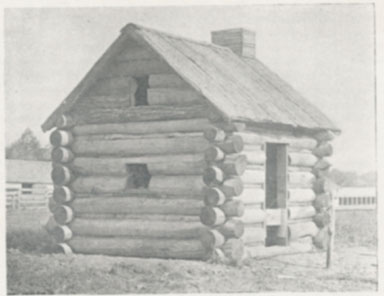
An 1897 reconstruction of Amos Sweet's Cabin.
Chapter IV.
The First Settlement.
It seems to be conceded that the first actual settler in the town of Dryden was Amos Sweet. Our information upon this subject is derived almost entirely from the "Old Man in the Clouds," the fictitious name of the author of a series of articles published in "Rumsey's Companion," the first newspaper published at Dryden, in the years 1856 and 1857, and which were, in fact, compiled by the editor from the information afforded by old men, then living, but since dead, and in that way preserved. We quote from the first number as follows:
"It was in the spring of 1797, that a man by the name of Amos Sweet came from the East somewhere, and, after ascertaining the location of his lot, put up a log house about ten feet square, just back of where now resides Freeman Stebbins [now John Munsey] in this village, where himself, his wife, two children, his mother and brother all lived. This would seem to be a very small and rude habitation to the people of our present gay and beautiful village. It was built of logs about a foot thick; these were halved together at the ends and the cracks chinked in with split sticks and mud. The house was eight logs high, covered with bark from the elm and basswood. Through one corner an opening was left for the smoke to pass through, there being no chimney or chamber floor. The fire-place was composed of three hardhead stones turned up against the logs for the back, and three or four others of the same stamp formed the hearth, these being laid upon the split logs which formed the floor. Inasmuch as there was no sash or glass in those days in this vicinity, their only window consisted of an opening about eighteen inches square cut through the logs, and this, to keep out the inclement weather, was covered with brown paper, greased over to admit the light. The door was also in keeping with the rest of the house, being composed of slabs split from the pine and hewn off as smooth as might be with the common axe. The hinges were of wood and fastened across the door with pins of the same material, serving the double purpose of cleet and hinge. In this house, thus built without nails and with benches fastened to the sides of the house for chairs, eating from wooden trenchers and slab tables much after the fashion of the door, did this little family of pioneers live."
But the title to the lot upon which Mr. Sweet built seems to have been defective and one Nathaniel Shelden appears to have had the real ownership, for in 1801, he compelled Mr. Sweet and his family to leave it. Elsewhere Mr. Sweet is spoken of as a "squatter", or one having no title, and Mr. Shelden is represented as using "fraudulent means" to dispossess him, but charity for both of these early pioneers compels us to believe that the difficulty grew out of the great uncertainty and confusion which then existed as to the titles derived from the old soldiers of the Revolution, some of whom had undertaken to sell the same lands several times over to different parties. At any rate Sweet was compelled to leave his pioneer home in 1801, and soon after, as the account says, "he sickened and died, and his remains, together with those of his mother and two children," were buried directly across the road from the Dryden Springs Sanitarium. The house remained for some time after, for we are told that it was used as the first school house for the children of the early settlers in the year 1804.
The new log cabin constructed during the summer of 1897 on the ground of the Dryden Agricultural Society was built of green chestnut logs and modeled after this first pioneer house in Dryden. It is intended to be preserved and it is hoped it will long remain as a relic of that kind of architecture, once so prevalent here, where now only the decaying remains of two or three log houses can be found in the whole township.
The fact that we now find no signs of the graves where Mr. Sweet and his family are said to have been buried, strikes us at first as singular, but a little reflection and an examination of the customs of the early settlers in that regard, supplies us with the explanation. The pioneers had too much to do to spend much time or effort in the burial of their dead and were too poor to go to much expense in such matters. Mr. Bouton, in his History of Virgil, says that the first grave-stone in that town was erected in 1823, although deaths had occurred there from its earliest settlement. He also explains their method of selecting places for the burial of their dead, which seems to us strange. We quote from pages 13 and 14 of the Supplement, where he speaks of a stranger who lost his way and perished in the woods, and mentions that he was buried near where he was found.
"Only a few families at this time (1798) resided in the town, which extended over ten miles of territory. There was no public burying ground and it was not possible to know where it would be located. * * * Families buried their dead on their own premises, and others, strangers and transient persons, were permitted to be laid in these family grounds. Ultimately it came to pass that one or more of these grounds came to be considered public, in a subordinate sense. There were a large number of them which continued in use after the public ground was opened."
Grave-stones as seen in the old cemeteries, where any existed at all, were then of the simplest character, many being made of native flag-stones, and the coffin of the pioneer was a coarse wooden box manufactured by the local undertaker, fifteen dollars paying for the very best.
When we come to think of it, a cemetery would not be much of an institution in an early settlement in the woods, especially where the living inhabitants had all they could do to keep soul and body together. Far different is it in a community of a century's growth, where now our cemetery tombstones, many of them imported from Italy and Scotland, represent the expenditure of many thousands of dollars, and the earth beneath them already envelops the forms of the ever-increasing, yet silent, majority.
Goodrich, George B. The Centennial History of the Town of Dryden, 1797-1897. Dryden: Dryden Herald Steam Printing House, 1898. Reprinted 1993 by the Dryden Historical Society. Pages 10-13.
(The Dryden Historical Society, which sells this book, may be reached at 607-844-9209.)
June 7, 2004
Contingency budgets, Ithaca Festival
The Ithaca Journal has an article today about the impact of contingency budgets on local school districts, looking at how they're calculated and what their past effects have been. Dryden faces a contingency budget if voters reject the second budget proposed by the board.
There are also an article and a thank-you editorial on Laurel Guy's stepping down as director of the Ithaca Festival to focus more on the Constance Saltonstall Foundation for the Arts in Ellis Hollow.
Plantation Inn revived
I had an excellent lunch today at the Plantation Inn, just up Route 366 from my house. I mentioned a while ago that the place was for sale. It sold quickly, it seems, and it's seen a new coat of paint over the last few weeks:
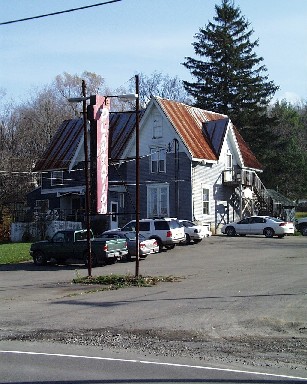
1285 Dryden Road, The Plantation Inn, November 2003. (map)
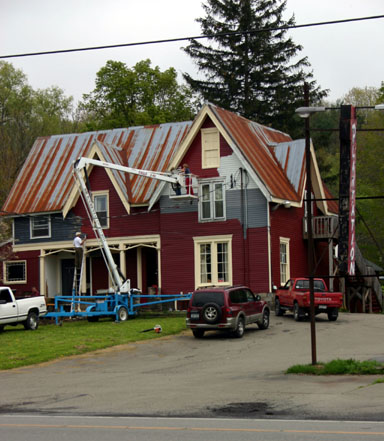
Painting the Plantation Inn, May 9, 2004.
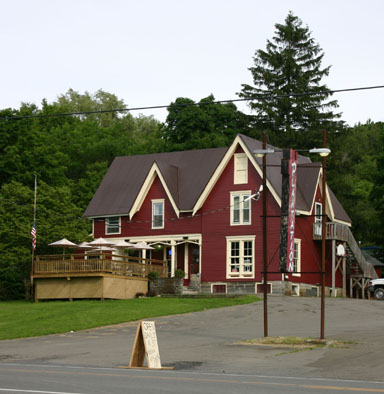
The Plantation Inn, June 6, 2004.
The new deck was great today, in warm weather with a breeze. They've left the old bar and classic refrigerator intact while rearranging the interior. The menu includes appetizers and sandwiches (including burgers and panini), and the fries were amazing. This part of the neighborhood now looks better and has good food as well - a great combination.
June 8, 2004
Republican (non)endorsements, family reunion fundraiser
Today's Ithaca Journal is fairly quiet on Dryden news, after a busy run for the last few weeks. The Tompkins County Republican Committee met to endorse candidates on Saturday, and "honored its tradition of not making an endorsement when there is a contested primary" by making no endorsement in the race between incumbent Congressman Sherwood Boehlert and challenger David Walrath. They did endorse State Senator James Seward.
Today's Journal also announces a 'last wish' fundraiser for Donna Freedline, to bring a family reunion to the area. The spaghetti dinner will be held at the Dryden Fire Hall (map) on Sunday, June 13th.
June 9, 2004
Dryden Dairy Day and more
This morning's Ithaca Journal is overflowing with Dryden news. That's not unusual on Wednesday, when the Our Towns section features Dryden and Groton, but today there's news throughout the paper, much of it even good.
A cow greets readers at the top of the paper, pointing them to to an article on Dryden Dairy Day, a schedule for Dryden Dairy Day, an article on dairy farming's state more broadly, and a look at milk's nutritional value. Dryden Dairy Day is Saturday, June 12th, starting with a 9:30am parade down Main Street.
Dryden also makes the front page because of the transit of Venus across the sun, which the Journal reports from the Hartung-Boothroyd Observatory on Mount Pleasant Road.
There's a brief piece on the Dryden school budget hearing last night and its discussion of $374,575 in spending cuts.
The print edition, but not the online edition, notes that the Dryden elementary school chorus will be presenting "Give My Regards to Broadway" at the Dryden High School auditorium this Thursday and Friday at 7pm, and that the Etna Community Association will be having an ice cream social on June 17th from 6:30pm to 8pm at Houtz Hall (map).
Cathy Wakeman's Dryden Town Talk looks at an event tonight and Thursday at 7pm at J & B Stables on Ringwood Road, where Lew Sterrett will be presenting a combination of horse training and Christian discussion in his "Sermon on the Mount" presentation.
In the Ithaca school district, the board granted Superintendent Judith Pastel a 3% raise, with outgoing board members (and Town of Dryden residents) Art Berkey and Henry Kramer dissenting.
Kramer also appears on the Opinion page, where he complains about the legislature's voting down a referendum on shifting to triennial assessment and a County Executive, and cites County Legislator Martha Robertson in particular. I'm a little confused, as the proposal Lane put forward was for a public hearing, not "allowing the people to vote". Kramer makes a point of noting Robertson's political affiliation and "A democratic (small "d") society", but fails to point out that the vote was hardly party-line, with three Republicans voting against Lane's proposal and only one supporting it.
In good news for the county treasury, sales tax revenue is climbing, though details on why are not yet in. Increased energy prices are one likely candidate.
June 10, 2004
Schools mourn teacher, student
This week's Dryden Courier is heavy with Dryden school district news. The lead article reports on the district's loss of science teacher Dennis Pollack to a stroke and student Jamie Cutting to an ATV accident, and the other front-page article covers the school budget being put to voters on June 22nd.
The paper also has an article on this Saturday's 20th annual Dryden Dairy Day, as well as schedules and sponsor lists.
Tonight's Town Board meeting
The Town Board is meeting tonight at 7pm at the Dryden Town Hall (map). The agenda is available. Highlights include two public hearings affecting the Route 13/366 overlap area, discussion of a new town hall, a report from Town Attorney Mahlon Perkins on actions in a dispute over an enjoining action because of a faulty septic system, "tax exemptions for renovations to a home (to accommodate a homeowner’s disability)", news that the NYSEG water plant is for sale, more discussion of sewer issues with the Village of Dryden, and a golf course update.
On the golf course, the full feasibility study from Tallman and Demarest has been completed. It's a large set of files, and you may want to explore parts of it.
- Final Report - Main content. (153KB PDF)
- Appendix 1 - Golf Market Data Analysis. (518KB PDF)
- Appendix 2 - Financials. (177KB PDF)
- Appendix 3 - Course Evaluation. (140KB PDF)
- Appendix 4, part 1 - Maps. (786KB PDF)
- Appendix 4, part 2 - Additional Analysis. (1536KB PDF)
The only piece which strikes me as glaringly wrong is in the market analysis, Appendix 1, which lists a "Hollow Brook Golf Course" as under construction in Cortland County, but gives the zip code as 10567. That course seems to be in Westchester County, not Cortland County, leaving only the course "in planning" at Greek Peak ski resort.
Minutes for the May meeting are also available now.
June 11, 2004
New Town Hall to be on site of old
This morning's Ithaca Journal reports from last night's Town Board meeting that the board settled on the location of the existing town hall (map) as the best of their options for building a new Town Hall. The combination of its having water and sewer, already being owned by the town, being familiar, and not needing to take more property off the tax rolls gave it an advantage over other properties the town had examined. The article also notes the delay in construction on Hunt Hill and Genung roads to next year.
Jennie Daley also has an article on student opinions about school district budgets in Groton and Dryden, and the Journal examines work the county legislature, led by County Legislator Martha Robertson, is doing to develop a low-cost prescription drug card for people without drug coverage.
June 12, 2004
Solar powered school, absentee ballots
I'm sorry to have missed it, but the Ithaca Journal covers last night's "School Power Naturally" event, where presenters discussed the two kilowatt system that was installed with a NYSERDA grant. The school's $1500 contribution should be made back in two years, but the system is deisgned more for educating students than powering the building. NYSERDA provides a site where anyone can monitor the panels, though they seem to have misplaced Dryden High School in New Lebanon, NY.
There's also mention of how to get absentee ballots for the June 22nd budget vote.
On Wednesday, the Journal published a schedule for today's Dryden Dairy Day, which looks to be getting plenty of sun today.
Dryden Dairy Day
This morning's parade had all kinds of floats, bands, and fun. Kids got lots of candy thrown from floats, and afterwards the crowd moved to Montgomery Park where tents offered ice cream, food, and all kinds of displays and games.
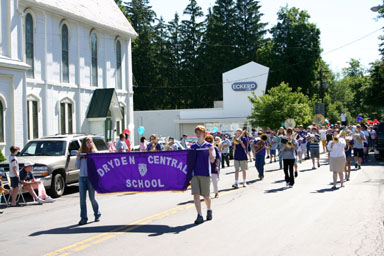
Dryden Central School Band marching at Dairy Days
I have a lot more pictures - 133 in all - and I've posted the whole set.
June 13, 2004
"Death, Hell, or Canada"
1812 saw the closest approach of war to Dryden since the Sullivan-Clinton Campaign during the Revolutionary War, and this time Dryden residents participated. George Goodrich tells what little is known of who participated and where, and what "Death, Hell, or Canada" might be.
Chapter X.
The War of 1812.
In the minds of the great mass of people of the present age, the importance of our war with Great Britain, known as the War of 1812, is overshadowed and lost sight of in view of the War of the Revolution which preceded it by about thirty-five years. It is not so regarded by the careful student of history. The earlier war made our country free, but it required the latter to make us really independent and respected as a nation. The latter war also did much to strengthen the bond of union between the colonies and to make of us a nation rather than a mere confederation of states.
Our ancestors were poorly prepared for either conflict with the mother country, supplied as she was with powerful armamentsand standing armies, and it was only the necessities of the occasion which seemed to suddenly call forth and develop in them the courage and heroism which enabled them to succeed. History affords but few instances where an inferior number of untrained men, called suddenly and unexpectedly to arms, have overwhelmingly defeated trained soldiers, as Jackson did with his hasty recruits at New Orleans; and we are not required to look so far away from home for instances of the same character. On the Niagara frontier in 1814 ("on the lines," as it was termed in those days,) General (the Colonel) Winfield Scott and his brave followers, usually opposed to superior numbers of the enemy, performed feats of military strategy and heroism, in the battles of Landy's Lane and Chippewa, which forced from the unwilling British officers exclamations of wonder and admiration, and cannot be read by us to-day without arousing pride within us, that we are among the descendants of such heroes. As we read of these instances we can hardly realized that they are not the events of some far-off country, belonging to some remote period of time, while they actually did occur within the present century and within five hours ride by rail from where we now live. With the exception of skirmishes with the Indians, and some events of the same character near Oswego, this is the nearest that war ever came, and we trust it is the nearest it ever will come, to our doors. How many of us realize that the company of Dryden militia which went out to "the line" under Captain (afterwards Major) Peleg Ellis, in July, 1812, were taken prisoners together with Colonel Winfield Scott at the battle of Queenston, which proved to be the Bunker Hill or Bull Run of that war, but was followed by hard earned victories which in the end placed the balance largely in our favor and secured a triumphant result?
It is to be regretted that we - and especially our young people - in choosing our reading matter, select descriptions of incidents far removed from us in time and space, or more often amuse ourselves by reading the alluring inventions of fiction; and then, when we chance to visit Niagara Falls and see on the opposite shore the imposing and magnifent Brock monument, 194 feet high, constructed of Niagara limestone and erected on Queenston Heights, the most prominent landmark as seen from Lewiston on the American side, we are compelled to remain silent or expose our ignorance by asking what that imposing column was designed to commemorate. If my readers will obtain from the Southworth Library, or elsewhere, "Lossing's Field Book of the War of 1812," a large and interesting volume, devoted to the description and illustrating the leading events of this war, they will find that the perusal of it will well repay their effort and enable them to repel to some extent at least the charge that Americans are woefully ignorant of their own history. They will find in it a reference to Colonel (afterwards General) Bloom, of our adjoining town of Lansing, and afterwards sheriff of Tompkins county, and to the regiment (which included the first Dryden company) which he led at Queenston, where he was wounded. We are indebted to researches of Charles F. Mulks, of Ithaca, for the information that Aaron Cass, one of the Dryden company from near Ellis Hollow, was struck on the head by a British cannon ball and instantly killed while the regiment was crossing the Niagara river in boats to take part in the battle of Queenston. Cass had been a distinguished soldier of the Revolution from Connecticut, was a brother-in-law of Aaron Bull, and settled in Ellis Hollow in 1804. Other soldiers of the Dryden company were Aaron Genung, from near Varna; Arthur and Stephen B. June, Marcus Palmerton, Jonathan Luce, George McCutcheon and Peter Snyder. With the exception of the statement that Judge John Ellis afterwards went out to "the lines" with the second Dryden company of militia, leaving but fourteen able-bodied men in the township, these are all of the recorded facts which we are able to give concerning Dryden's participation in the War of 1812. It is regretted that the accounts of Dryden's volunteers of that date are so meager, and it reminds us of the necessity of committing to a written record the achievements of the Dryden soldiers in the War of the Rebellion, before all of them shall have passed away, or they, too, will be lost to local history.
We are fortunately able to give from the relation of Thomas J. McElheny, whose mother was a niece of Major Ellis, an incident of the battle of Queenston which he has often heard his great-uncle relate, and which is as follows: As the Dryden company were crossing the Niagara river to the Canada side, Stephen B. June, impressed with the importance of the occasion and boiling over with the true martial spirit, arose in his boat and swinging his hat defiantly called out as the watchwords of the expedition: "Death, Hell, or Canada." This was early in the morning of the day when everything was hopeful and few of the enemy were in sight. The battle of the morning was successful. A landing on the Canada shore was effected, the Queenston Heights were gallantly scaled and captured and the Commanding General Brock of the enemy was mortally wounded in the conflict. But in the afternoon the reinforcements of the enemy arrived in overwhelming numbers, while the help expected from the American side failed to appear, and after a brave but hopeless effort at resistance, the whole American force, including Colonel Scott and Captain Ellis with their followers, were taken prisoners. Not seeing his townsman, Stephen B. June, among the prisoners, Captain Ellis went back on the battle field to look him up, and after searching found him very severely wounded by a ball which had entered his mouth and passed out of the back of his neck, just below the base of the skull, fortunately missing the spinal cord. Finding that June was alive and still conscious, although fearfully wounded, Captain Ellis asked him which it was now, "Death, Hell, or Canada," to which the wounded soldier feebly but firmly replied: "I can't tell quite yet, Captain, which it is, but when the British bullet struck me I thought I had them all three at once." June lived to return home and, if we are not mistaken, some of his family descendants are still inhabitants of the town.
Since writing the above we learn that Geo. R. Burchell, Esq., of Dryden, is a great-nephew of that same Stephen B. June, although the most of that family have removed to Alleghany county and further west. The original commission of Major Ellis as captain, issued to him February 11, 1811, by Daniel D. Tompkins, the governor of the state, is one of the relics which were on exhibition at Dryden's Centennial Celebration.
Goodrich, George B. The Centennial History of the Town of Dryden, 1797-1897. Dryden: Dryden Herald Steam Printing House, 1898. Reprinted 1993 by the Dryden Historical Society. Pages 30-33.
(The Dryden Historical Society, which sells this book, may be reached at 607-844-9209.)
Questions
Most of what I've been doing here for the last seven months has been reporting. Making information about Dryden available seems like a good thing to do, and I plan to continue doing that, hopefully at a faster pace than I've managed these last few weeks.
I'd like to add something different, though, something which invites readers to think beyond a particular story. In addition to telling about things, I'll be asking something, probably once a week. I don't think most of the questions will have simple answers, or at least they won't have answers that everyone readily agrees upon. You'll be welcome to talk about your answers in the comments, or just to think about what answers might be.
June 14, 2004
Where do you live?
"Where do you live?" feels like a good starting question for a weblog based on a particular location. For some parts of the Town of Dryden, especially the villages, I don't think it's a difficult question. In a lot of other cases, as Dryden has houses all over, it depends on context and a sense of what's close, or not.
I live in an odd border zone, east of the area marked as Varna but still considered Varna by the Varna Community Association and by me. I use the Boxcar as a reference, but lots of people even in Tompkins County don't take 366 enough to know that, so I use Treeforms, the Exxon station, or the intersection of Routes 13 and 366 as a reference. Even when describing it to people from the area, it's sometimes difficult to describe.
Parts of the town are harder to identify. Along the western edge, Bethel Grove, Snyder Hill, Ellis Hollow, Varna, and West Dryden all have names, but the area around Hanshaw Road and Lower Creek doesn't have a hamlet nearby until you reach Etna. The Freeville zip code contains huge amounts of Dryden's central areas, but Midline Road isn't exactly in Freeville.
Then there's the question of describing where I live to people with less idea of the area. When I was in college, saying I was from New York got me the "which borough?" question, so I took to saying I was from "beautiful upstate New York". People didn't always understand that either, but they got the idea that I wasn't from New York City. People who have a grasp of upstate New York geography often know where Ithaca is but not Dryden, so then I become from "near Ithaca". I've heard the Village of Dryden described as "near Cortland".
Finally, wherever you live in the town (if you live in the town), how often do you say you live "in the Town of Dryden"?
Dairy Day, accident on Lower Creek
Today's Ithaca Journal has a picture of children throwing candy from a float at Dryden Dairy Day, as well as mention of an accident on Lower Creek Road.
The accident report says "she lost control of the car on loose gravel." At the Town Board meeting Thursday night, Highway Superintendent Jack Bush listed roads currently being resurfaced, including Lower Creek, and warned about the gravel surfaces that are a temporary part of that process. If you find yourself on a gravel road, he cautioned, slow down.
Moving through Varna
It's been a few weeks since I posted my last set of Varna pictures, and it's time to push west. After the Varna Inn area, there's a bit of a break, with an empty lot on the north side of the road and empty frontage at Hillside Acres on the other.
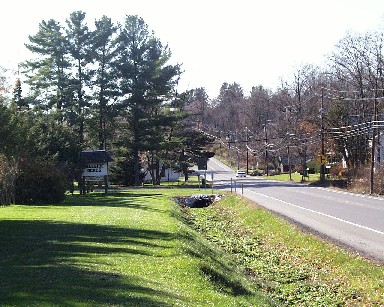
Looking toward Hillside Acres in Varna (map)
Then there's a cluster mostly of houses, with a hair salon in the middle.
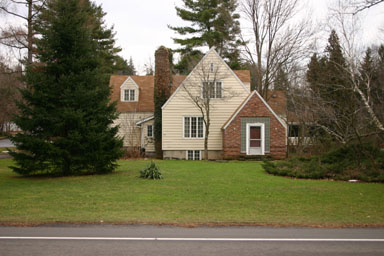
909 Dryden Road (map)
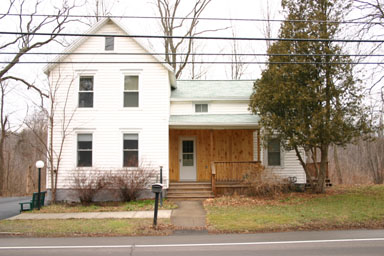
908 Dryden Road (map)
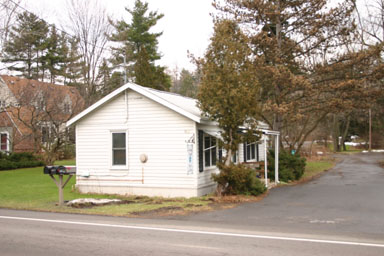
907 Dryden Road, Savage Creek Hair Salon (map)
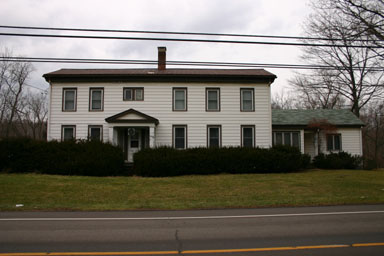
904 Dryden Road (map)
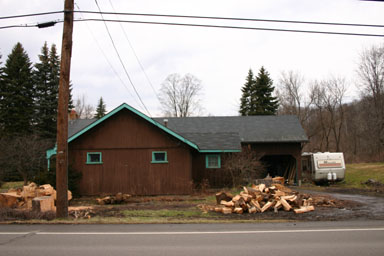
902 Dryden Road (map)
Henry Kramer considers run for County Legislature
I happily pick up any free newspaper I find in the bins at the supermarket, and I found a new one today: The June Issue. It's published by Ithaca High School students, apparently because the last issue of their regular paper, The Tattler, was cancelled.
I wasn't particularly looking for Dryden news in it, but they had an interview with outgoing school board member Henry Kramer, and asked him if he planned to run for the Board of Education again or for other public office. His reply:
I want to continue to give something back to the entire community. I am seriously considering seeking the Republican nod for the County Legislature seat from Dryden now held by Martha Robertson. I have no plans to run again for the Board of Education, but won't rule it out when there is a new Superintendent.
Those aspirations might explain Kramer's June 9th letter to the Ithaca Journal.
Apart from the politics, this makes me wonder about something: when does a candidate become a candidate? "Seriously considering" sounds strong, but the election is over a year away. Maybe it's too soon to be asking this question, but Kramer seems to be campaigning already.
June 15, 2004
Preschool, Reagan, specialized degrees
Today's Ithaca Journal mentions Dryden in two stories, while the editorial focuses on TC3.
In an article on New York State's efforts to back preschools, Dryden Superintendent Patricia Archambault discusses space problems and the instability of state funding as reasons Dryden doesn't have a pre-kindergarten program.
Steve Scott of Dryden ranks Reagan in the "top 10 of all time" among presidents in an article on local residents' perspectives on Reagan.
In the editorial, the Journal commends TC3 for adding more specialized programs and providing a low-cost pathway to a variety of jobs.
June 16, 2004
Dryden Dairy Day, school budget
The lead article in the Our Towns section of today's Ithaca Journal is Dryden Dairy Day brings town together, which takes a look at last Saturday's event from the parade to events to the current state of dairy farming. Pictures on the web site are in color, while they're black and white in the paper.
The Dryden Briefs include lots to do this summer, including the concert series Wednesday nights in Montgomery Park, the "Summer Skies" programs for children ages 9-13, and a creative writing workshop in Freeville.
On the Opinion page, Dryden School Board President Rachel Dickinson writes about the second school budget, which will be going before the voters on June 22nd. She discusses voter response to the first budget and the tie vote, how the budget fits with projections of state aid, the relationship between the budget and the teacher's contract (to be voted on June 23rd), and what happens if the budget fails and the district has to go to a contingency budget.
June infrastructure issues
Finally, time to write about last week's Town Board meeting.
Highway Superintendent Jack Bush told the board that highway crew had made progress in spite of the rain, putting down the first layer of surface treatment on roads including Upper and Lower Creek, Brooklyn, Game Farm, Dodge, Barr, and the portions of Ellis Road and Enterprise Drive which weren't annexed to the Village of Dryden. He warned that while this first layer is curing, there would be loose stones, and that drivers should slow down. (Since then, there's been an accident on Lower Creek Road where loose gravel was a cause.)
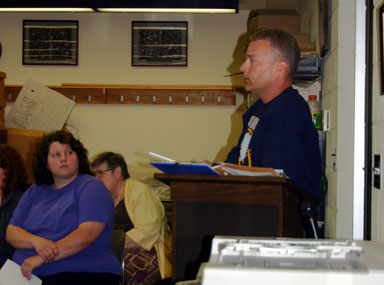 Jack Bush at the Town Board" />
Jack Bush at the Town Board" />
Jack Bush reporting on highway construction to the Town Board
Bush also told the board that "There is going to be no work done on Hunt Hill and Genung. There is no way." Aerial photography, planning, consultation with residents, and work on Virgil Creek starting August 15th means that the work, which has been controversial, will be delayed until next year. Residents will still be notified about planning, and the Town Board will formally discuss removing those roads from the list of work to be done next month. Temporary repairs on Hunt Hill Road appear to holding up well.
Bush proposed adding a mile and a half of roads along Yellow Barn Road, including Top Forty Road, Foote Road, Corn Crib Road, Thresher Place, and Spring Run to the list of work to be done this summer, and the board approved the additions.
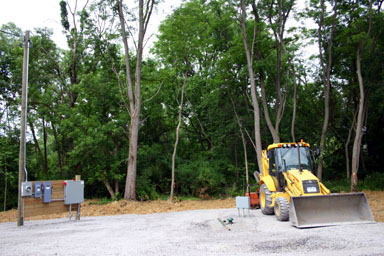
Sewer pump work completed at Freese Road
After discussing how much the cost of asphalt, gasoline, and other road materials had increased, Bush also noted that the work on the sewer pump at Freese Road was nearing completion, with just some grading and landscaping to go. The pump, which failed in January, is now operational.
A resident of Midline Road complained during Citizens' Privilege of the dangerous state, both in repairs and signage, of Midline Road, leading to discussion with County Legislator Martha Robertson about prospects for focusing the County's attention on the problems.
During the County Briefing, County Legislator Mike Lane talked about how the county is facing the same pricing pressures as the town on highway materials costs, and talked about the county's reponsibility for maintaining bridges on both town and county roads as well. Dryden has more than its share of bridges, with a third of the county bridges and half of the town bridges. Lane also discussed the airport's current status, and how having an airport affects economic development in the county. Martha Robertson pointed out that a working group of county and Cornell representatives were meeting to discuss concerns, and that the airport was high on that list, with the business school doing analysis.
The Town Board also discussed its own infrastructure, in the form of a new town hall. Councilman Steve Stelick showed maps and diagrams of the various options considered for a new town hall, and consensus on the board was that all of the options were too expensive except for the current location, which has water and sewer though it may need some more acreage. The board approved moving forward with an architect on the basis of using the current site.
Later in the meeting, the board discussed one last infrastructure issue, the computers in town hall. Councilman Marty Christofferson had met with the Computing Center, and pared down their proposal (625KB PDF) to essentials. The board approved spending up to $15,000 to upgrade systems in the Town Hall. Councilman Stelick said that the previous Board had left additional money in the discretionary fund to cover such expenses.
On sewer infrastructure, Town Attorney Mahlon Perkins said that he hadn't heard anything from the Village of Dryden on negotiations for the Cortland Road Sewer District that were the subject of an earlier meeting.
Near the end of the meeting Zoning Officer Henry Slater and Engineer Dave Putnam discussed renewed interest from NYSEG in giving the town an old water pump station on Lower Creek Road, which I wrote about a long time ago. It hasn't been used since 1989. Slater and Putnam said that the building's construction right in the floodway of the creek limits its potential for redevelopment and use, but that the fire companies were interested in it as a training site and as a water collection point for their trucks. The town board was interested, provided that the price tag was a dollar or less.
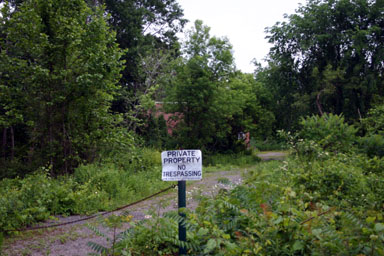
NYSEG water pump building on Fall Creek off Lower Creek Road
2004 Dryden graduates, Dairy Day, solar
This week's Dryden Courier includes pictures of the Dryden High School class of 2004, from Allmendinger to Zhankov.
The articles explore the 'hordes' at Dryden Dairy Day and the presentation Friday night about the solar panels on Dryden High School. Tricia Edgecomb discusses students making faux stained glass at Cassavant Elementary School, and there's an obituary for Dewitt R. "Toad" Perkins, as well as letters on the Dryden school budget and the impact of smoking bans on restaurants and bars.
June 17, 2004
Septic problems reach paper
Today's Ithaca Journal covers a complicated problem that's come up at two recent Town Board meetings. Reporter Jennie Daley takes a close look at the water contamination problems at Cindy and Craig Basl's home and their struggles with the county and the neighbors to resolve them.
The county has declared the septic system next door, at 483 Hunt Hill Road, to be failed, and enjoined (through the Dryden Zoning Office) people from living there. (Dryden Town Board discussions at the last two meetings have focused on the enjoinment action.) There are some large questions of jurisdiction, evidence collection, and enforcement here, all complicated by the house remaining in the name of a woman who died in 1991 - a will hasn't been completely resolved, and there is a dispute over the septic system between the current holders of the property, and Casey Gaul, who was buying it from them.
The article doesn't offer a lot of hope, as a negative dye test (which doesn't necessarily mean there is no contamination) seems to have kept the county from taking action, but perhaps this publicity into the complications will help the Basls get closer to clean water. Nothing else seems to have worked so far.
(I covered discussion of this at the May meeting earlier, but haven't yet written up the discussion at last Thursday's meeting.)
An article on the Budget and Community Advisory Panel's report to the Legislature on how to handle budget issues quotes two Dryden legislators with divergent opinions. County Legislator Mike Lane describes the report as "asking us to think outside the box and challenge us to reinvent ourselves", while County Legislator Martha Robertson expresses concern that "there are real differences between government and business".
An article on the damage being done by a beetle that eats viburnum plants starts by quoting Dryden resident Ann Levatich.
Planning board meeting, ice cream social tonight
The Planning Board meeting , tonight at 7pm at the Dryden Town Hall (map), will include hearings on three subdivisions near Etna: two phases of the Daniel Armitage subdivision (one at the corner of Wood and Sheldon Roads, and the other at the corner of Wood and Etna Roads) and the Ardis Adams subdivision in the 400 block of Etna Road. I'm guessing they'll also be discussing the Draft Comprehensive Plan, but there's no mention of that in the notices.
In Etna itself, from 6:30pm to 8pm, the Etna Community Association will be having an ice cream social at Houtz Hall (map).
Etna ice cream social
Today was the kind of day that really calls for ice cream, so I stopped by the Etna Community Association's ice cream social at Houtz Hall on my way to the Planning Board meeting. For $1.75, I got two huge scoops of strawberry ice cream with hot fudge and a tasty brownie. I wasn't the only one enjoying myself, either.
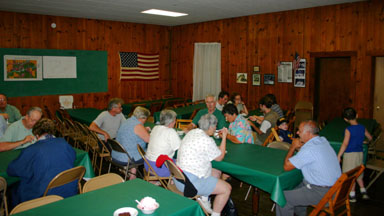
Etna Community Association ice cream social
I left the social early to get to a Planning Board meeting that was supposed to start with some hearings on subdivisions in the Etna area, but the board didn't have a quorum, so those hearings have to be rescheduled. Instead, the board talked with a large audience about the potential impact of the Draft Comprehensive Plan on farms. That'll take me a few days to write up.
June 18, 2004
Family reunion, TC3 tuition hike
This week's Ithaca Journal seems to be overflowing with Dryden-related news. This morning's paper brings an article on an upcoming family reunion for Freeville resident Donna Freedline supported by the Fairygodmother Foundation and an article on TC3's 5.4% tuition hike, adding $75 a semester. TC3 president Carl Haynes notes that that tuition is still well within the aid level available from New York's Tuition Assistance Program (TAP).
At the County level, Dryden County Legislator Mike Lane is quoted opposing the addition of two new staff members to the assessor's office in support of annual assessment, which Lane had proposed shifting to every three years.
There's also an article whose headline claims to see optimism in the county jobs outlook, but most of the article sounds more like the market is steady rather than growing. The Manpower poll they cite did show an increase to 27% now from 17% last quarter of companies predicting an increase in hiring activity, but 33% of employers were planning to increase hiring levels last year. (I'd also like some data looking back - did employers actually increase hiring then?) They quote Home Depot as needing people for seasonal reasons and Ithaca College is seeing stability. It's not like the area's facing a huge drop in employment, but the optimism in the article seems like it should be pretty mild.
On the opinion page, Kimberly Gazzo examines the costs of the Dryden school budget proposal up for a vote on June 22nd, and encourages people to vote yes.
June 19, 2004
Ithaca redistricting, Dryden budget
Today's Ithaca Journal reports on prospective Ithaca City School District elementary school redistricting, and links to the school district's report on the matter (694KB PDF). I was hoping for detailed demographics of the areas served by the schools, but didn't find them. There's lots of other information there, though!
On the opinion page, there are letters pro and con on the Dryden Central School budget revision up for a vote on June 22nd.
This week's history article explains the origins of place names in the Military Tract, including Dryden.
June 20, 2004
Voter registration by party
I finally got to look at the registration data I picked up from the Board of Elections in May. People have probably moved in and out of the district, adding new voters and taking others out, but this is where registrations in Dryden stood in May.
| party | number |
|---|---|
| Blank (Independent) | 1720 |
| Conservative | 71 |
| Democratic | 2803 |
| Green | 110 |
| Independence | 251 |
| Liberal | 69 |
| Republican | 2805 |
| Right-to-Life | 21 |
| Working Families | 20 |
I'd heard at various times about Republican and Democratic advantage here, but it looks like it's within two votes for the major parties.
Agriculture at Planning Board meeting
For the second time this year, the Planning Board didn't have a quorum, so the meeting was purely discussion of the Draft Comprehensive Plan's agriculture section with the crowd of farmers and farm representatives who were there. (The three public hearings on Etna subdivisions had to be postponed.)
The discussion began with a general distribution of photocopies, some of which were from the Planning Board and some of which were from attendees of the meeting. The Planning Board distributed a summary of the agriculture discussion in the plan, as well as a map demonstrating how fixed-ratio zoning would work. There were also letters from the Tompkins County Agriculture and Farmland Protection Board about Town of Ithaca zoning and a discussion of "upzoning".
Because the speakers at the meeting generally got to present coherent speeches (and because my recorder worked much better than usual), I'm going to try to present as much of this as possible in the speakers' own words.
George Frantz gave an introduction, noting that one of the purposes of the plan was:
"to recognize agriculture as a legitimate long-term land use, really in reaction to the tradition in New York State of treating agriculture as sort of the orphan in terms of zoning and land use... Agriculture is going to be the primary recognized use in these districts, and other land uses are going to be subordinate to that....
"The idea is to have a zoning district for agriculture that allows agriculture-related commerce and allows farmers the option of having supplemental income sources for their operation.
"And then, to help protect farming from inappropriate levels of zoning, we're proposing something called fixed ratio zoning, which would allow one residential lot for every ten acres of land within a particular parcel of land. The way this works is, we're not saying carve a farm up into 10-acre minimum lot sizes... In fact, the ideal would be to having a maximum lot size for non-farm development of only two acres, and that would leave eight acres in agriculture...
"Minimum lot sizes of 5 acres, 10 acres... whatever, do not protect agricultural land. It cuts it up into lots that are too small to farm and too large to mow."
Frantz also talked about cottage industries, small industries that aren't related to agriculture, but which can use existing farm buildings. "We're looking at ways to allow farmers the flexibility they need as business people to make sure they have enough income coming in to support and supplement the agricultural operation," he said. Frantz also discussed the need to keep high-density residential development out of farm areas to prevent conflicts, and limiting the extension of water and sewer services, keeping development pressure off farms.
After Frantz spoke, Lin Davidson, president of the Tompkins County Farm Bureau spoke, and noted that the "10 acre" minimum description wasn't correct - it was rather the "upzoning concern I have which is the encumbrance of the extra ten acres not being developed," feeling it "reduces the viability and net worth of the farm." Davidson also noted that "if people want to move into an ag area... Cooperative Extension has a handout for people that move into ag districts... when they buy into that... they're dealing with farmers working late in the fields, they're dealing with smells, they're dealing with chemistry... they're duly notified informed by law of the situation that they're buying into."
After Davidson spoke, Ken Miller, who's spoken at two previous Planning Board meetings, introduced Fred Hudson, a regional appraiser with First Pioneer Farm Credit. Hudson spoke at length, and presented the board with detailed notes (12KB PDF), which he was kind enough to send me for posting here.
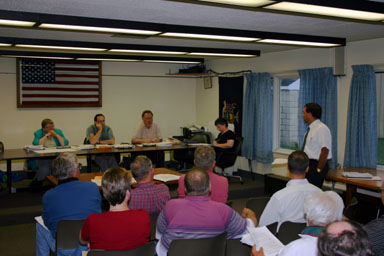
Frederick Hudson speaks to the Planning Board
Hudson emphasized the impact of zoning policies on appraisal evaluations and their effect on farm net worths, saying:
"You might as well call it a conservation easement, because when you legislate the rights of development around from the other 90% of the land, whatever ratio that may be, you're essentially eliminating the ability of that property to be used for some other use. You're leaving agricultural use, recreational use, or some other open space, and that's effectively what a conservation easement does.... Legislatively, it happens to take that right away from the farmer without compensation....
"I think that most of the farmers and lot of people in the agribusiness world will contend that the best line of defense for protecting agricultural land is the farmers themselves. They aren't going to do anything to that's going to jeopardize the business unless they absolutely have to. Whether it's the ability to generate income for a catastrophic happening, somebody is ill or dying, there has to be a mechanism there. It's not just one lot, it's not just $5000 or $10,000 - some of these happening are hundreds of thousands. There has to be a mechanism that farmers can rely on to get themselves out of trouble... and it won't happen with fixed-ratio zoning.
"The great impact of this fixed ratio zoning falls on one class of people, the farmers... the biggest changes in this plan will fall on this class of people, and we don't think that's fair.
Hudson discussed the ways that banks appraise for collateral for the "highest and best use to come up with a value". Hudson did some research building from a hypothetical 120-acre piece of property in the plan, contesting the plan's claim that it didn't affect the economic viability of the farm. Hudson's notes have the complete description, but working with conservative numbers, he found fixed-ratio zoning would cost farmers 13% of that farm's value (going from $312,500 to $271,600) under the best-case scenario.
Hudson also brought up another option, from a survey sent to Dryden residents a few years ago:
"59% of the respondents were in favor of protecting open land, agriculture land, and thought that the town should tax people to pay for development rights... It's mentioned about two times in the beginning of the plan, and then jumps into fixed-ratio zoning, without saying anything more about it..."
Hudson also noted that the plan claims to conform to the Tompkins County Agriculture and Farmland Protection Plan, but that "the Farmland Protection Board specifically stated 'land use controls to preserve farmland will not provide an effective mechanism to maintain its farmland base and agricultural industry, and that such farmland protection strategies are not viable at this time in most areas of the County.'"
Charlie Hatfield spoke about the connection between "open space, green space, but it's agricultural people that create that... I don't think you can tell people to build in town - if they want to be in the country, that's where they want to be. To me, it's costing the farmer to provide green space for all the rest of us. You can't stop people from selling land... the farmer's going to pay in the end to keep green space. Sure, everybody wants to live in the area with green space, but they don't want to pay for it. They want the guys that own it to maintain it, but yet pay their taxes every year."
Dan Konowalo, a Lansing farmer and Chairman of the Tompkins County Agriculture and Farmland Protection Board. While acknowledging that his board hadn't yet seen this proposal, he compared it to:
"a very similar proposal in the Town of Ithaca... This fixed-ratio zoning is a lightning rod. This is the one thing that people pick up on, and I myself picked up on it right away, and I said to the person presenting this, it's a great way for the village folks, for the citified folks to have the farmer pay the taxes on the land, pay the time, labor, and diesel for mowing, and adding a nice expanse, and that's what a lot of people think of as greenspace, is a nicely-mowed hayfield. This is ensuring that the farmer no longer has development rights without paying for the development rights, an unlawful taking....
"George brings up the bogeyman of city folks moving out into the country unbeknownst to the ills of being near a farming operation. It's funny...my land is not on the market, but I've had people knocking on my door to see if I'd knock off a piece... It's something that is desirable for a certain number of people...
"Planners say that they like mixed uses together, and this seems to mitigate against the free choices that would allow mixed uses to come in. The farmers that I have heard from just think that fixed-ratio zoning is the worst thing since non-sliced bread."
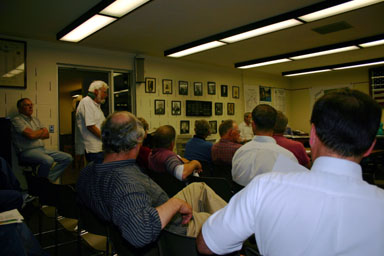
Dan Konowalo speaks to the Planning Board
Greg McConnell, a loan officer at First Pioneer Farm Credit, also spoke about "working with a number of Dryden farmers" and having reading parts of the plan and minutes of prior meetings. He said:
"I think there are some very positive points, some real attempts to set some goals that might be valuable to all the residents of the Town of Dryden.... Where the disparity sets in is how do we arrive at those goals. Open space sounds good, preserving unique natural areas, preserving ag land, making towns thrive... all of these goals are commendable.
"Number one, can you legislate your way to that, number two can you only rely on legislation to get you there, and number three, are the legislations that are proposed tugging the other way? ... For me as a wage-earner, my equity doesn't all lie in my land - a lot of it lies in my 401(k)... - but for a lot of farmers that I work with, their retirement is their land, whether they're going to pass it to the next generation, sell the whole thing to another farmer, who by the way buys it as an investment... so for the farmer, what they rely on for retirement is their land. So if Fred's numbers are right - and I believe they are conservative, it may be a much bigger haircut. The average farm I work with is somewhere between five and seven hundred acres, so you extrapolate those numbers and we're talking about somewhere between 300 and 400 thousand dollars has just been deducted from their equity.
"One of the tugs of war here that I mentioned early between the goals being set and the mechanisms going the other way... this plan benefits non-farmers with parks and trails and open space... but to fund those, it's planning a 1% increase per year in taxes. Those taxes are paid by farmers as well as other Dryden residents... that only adds to the inequities... Nowhere in the plan does it factor in the role of excessive property taxes actually driving premature conversion of land.... Income isn't necessarily derived at the time taxes are due.
"The other thing the plan doesn't acknowledge is the role of part-time farmers... who do play a role in preserving open space."
McConnell also felt that developers would prefer the fixed-ratio lots to the cluster development proposed elsewhere in the plan, driving development away from the villages and hamlets. He concluded by saying that:
"If this is really the goal of the people of Dryden, I think it can be arrived at in ways other than robbing the equity from farmers, and I think it can be done in many different ways... addressing the inequity of the amount of services farmers use relative to the amount of taxes they pay...trying to incent... not expecting developers to go against market forces, but incenting them to go where you want them to... we need to take into account that even though the public wants these things, but are they willing to pay for them?"
After these presentations, there was discussion and questions, focusing on what can be done to help farmers stay in business. A lot of those options are beyond the control of the town, like paying higher prices for food or using an income tax rather than a property tax to support government. Farmers are currently stuck paying property tax even in years where their property-heavy business produces a loss, so an income basis would help. The agriculture district protections seemed generally applauded, though Ken Miller wanted to see awareness of those programs reach beyond real estate people. Making life in villages and hamlets more desirable was also an option, though one that may take a while.
Craig Schutt, of the Conservation Board, suggested that the Conservation Board was concerned about many of these same issues, and would be willing to work with farmers to address them.
On the Purchase of Development Rights (PDR) front, George Frantz noted that the Town of Ithaca had established them, but when development pressures were low, it was hard to get farmers interested in them. Some of the discussion suggested that any changes to zoning were an infringement on the rights of the current owner, and Greg McConnell suggested that some of these proposals were sleepers whose impact would only surface in a decade or so. Barbara Caldwell, the chair of the Planning Board, did note that the board had said that they'd certainly consider rezoning as properties were taken out of active farming.
Frederick Hudson and George Frantz both raised the need to keep farming infrastructure functional and farms contiguous, avoiding scattered development that makes it difficult to farm.
Evan Carpenter, who owns a farm in Dryden near the village, currently marked in the Future Land Use Plan (301KB PDF) as red suburban residential, one of the places that is facing residential pressure, talked about his perspective:
"I don't think the object here is to save farmland, it's just to slow down the exodus from the farmland. I look at the map, and everything south of Dryden, the darker green, used to be farmland... it's gone back to what it was originally intended to be by the glaciers... and it is now trees. For those that want to live in open spaces, that doesn't work, since they just have a view of the trees next to them. It doesn't work for higher-density housing either because of the elevation, there is no road infrastructure up there, pumping water uphill gets a little expensive, running the sewage back down to Cayuga Lake would be no problem, but other than that, the infrastructure isn't really there.
"West Dryden is being left as open areas, but I'm not sure who's going to mow the swampland. It's not viable ag land... once they stopped farming with horses, that's what that wetter land begins to do.
"As far as PDRs, there isn't a lot of pressure here, but once the pressure becomes so great, dairying is kind of out of the window and we're talking about veg crops or vinyards or something other than animal agriculture... No one's going to want a chicken barn next door, or a hog facility, 2000 cow dairy, 200 cow dairy, and probably not even my 50 cow dairy facility. I don't have any answers but I understand the dilemna. I thank Ken for getting the guys from Farm Credit here with some numbers, whether they agree with George's or not. I think it's good to get debate with numbers out in the open. I can see both ways - I can see where somebody doesn't want their farm values devalued, and don't want mine increased to $25000 acre building lots either. Just don't let the appraisers see that map and think I ought to be paying that kind of money."
Planning Board member David Weinstein pointed out that the Planning Board is working on an agricultural overlay for working farms in the red areas designed specifically to keep appraisers from increasing taxes to the detriment of farms. George Frantz also talked a bit about a town in Monroe County that had set up assessments specifically to benefit farmers, but that option doesn't work well in Tompkins County's countywide assessment system and also had an impact on the local school district.
Because of the lack of a quorum, the Planning Board couldn't take any action on the discussion, but the conversation seems likely to continue for a while. There was also discussion of having a group of farmers get together - after the harvest - to discuss mechanisms they felt might encourage agriculture and preserve the character of the area.
June 21, 2004
Car crash kills two on Fall Creek Road, blood drive Friday
This morning's Ithaca Journal reports that two Freeville residents were killed and a third critically injured in a one-car crash on Fall Creek Road south of Malloryville.
The paper also announces a blood drive sponsored by the Varna Community Association in honor of 8-month old Aidan Raffe. The drive will be held at the Varna Community Center (map) from 1pm to 6pm on Friday, June 25th.
A caption to an article on Saturday's Ithaca Pregnancy Center Walk for Life mentions a missionary, Ben Skaggs, sponsored by the Bethel Grove Bible Church.
In the opinion section, Mary Ellen Bossack writes to encourage voters to support the June 22nd budget vote, stating "A no vote penalizes students, not the decision makers."
There's also a guest column by County Legislator Dooley Kiefer about the County Executive proposal and assessments, replying to an earlier letter from Dryden resident Henry Kramer.
When do you buy in Dryden?
It seems like starting each week with a question is a good idea.
I've been noticing a lot more when I buy things in Dryden and when I don't, and the distance I've been willing to drive has been shrinking. When we first moved to Ithaca, we spent a lot of time in Corning, including shopping trips, because we knew where things were. It wasn't convenient, but since we were seeing family there anyway, it wasn't too far out of the way.
When we bought the house, I made periodic trips to Auburn, Binghamton, and Elmira to go to Lowes or Home Depot, but I do much less of that now. Partly there's less to do on the house, partly I haven't been thrilled with the quality of things I purchased there, and partly I know where to find things locally now. Even the Home Depot on the south end of Ithaca feels far away if I can get something at Bishop's in Lansing.
I used to go to Cortland on a regular basis when Woodworkers' Warehouse was there, but since they've disappeared in bankruptcy, I don't go there very often any more. We visited Staples there recently when we were already in Cortland, but Cortland feels pretty far away lately.
For groceries, I do some shopping in Dryden and some in Lansing or Ithaca. The Exxon at the corner is convenient for small emergencies, and Ludgate Farms has all kinds of extremely tasty stuff and isn't far from me. If I'm in the Village of Dryden anyway, I'll stop at Clark's, especially since they're the only place I've found here selling Freihofer's cracked wheat hamburger buns. Otherwise I normally go to P&C in the Town of Ithaca or in the Village of Lansing.
I used to go to Ithaca Agway a lot, but the Dryden store is a lot easier to deal with. It's smaller, but that's convenient in its own way. If I'm just going to Agway, I'm always heading to Dryden.
There are lots of other categories - restaurants, gasoline, clothes - and you can't find everything in Dryden. It's either a plus or a minus that Dryden is surrounded by shopping options in Ithaca, Lansing, and Cortland, so shopping often means crossing a municipal boundary or two.
Most people don't notice boundary crossings. Some (like those in Bethel Grove) don't have much easy option for shopping in Dryden anyway, given geography. Others shop where they work, not where they live. Where do you shop?
New Town Hall site maps
I mentioned in an earlier story that the Town Board decided to focus discussion of a new Town Hall on the existing site. Since then, I've gotten some of the photos discussed at the meeting, of the existing site and Ellis Drive site (1354KB PDF), and of the Aramark site on Etna Lane near Route 13 (337KB PDF).
I'm a sucker for maps and aerial photos.
Another visitor
Back in April I posted some pictures of a visiting cardinal. The cardinal still enjoys banging into our windows, but now I have a new visitor:
I'm not sure what to make of this one, since it seems a lot more peaceable, just hanging out on the storm windows.
June 22, 2004
New Dryden superintendent
Today's Ithaca Journal reports that the Dryden Central School District has hired Mark J. Crawford as superintendent. Crawford is currently middle school principal in the Williamsville Central School District, and will take over from Patricia Archambault, who retires July 1st.
There's also a letter from Arthur Barry of Dryden describing the war in Iraq as "the effect of sin" and finding Jesus "the only way out of the madness."
Counties lobby state on Medicaid
Over in the Corning Leader, I found an article on county leaders lobbying in Albany and meeting with school officials. It looks like a bipartisan effort, including Republicans like Chemung County's Tom Santulli as well as Democrats like Tompkins County's Tim Joseph. Tompkins County isn't the only place facing tax increases because of the state's handing costs to localities:
Allegany saw a 24 percent jump in its share of the health entitlement program costs compared to last year's spending. Costs in Steuben spiked 16.5 percent and Chemung paid 20 percent more this year.
The Elmira Star-Gazette also covers the meeting in detail. (Like all links to Star-Gazette stories, that one will expire in a week or two.) Unfortunately, the Ithaca Journal covers it only with a general AP story that includes far fewer details.
Update: it looks like some Syracuse city councilors and the president of the Syracuse school board have had enough of lobbying and are turning to civil disobedience to make their case. That's a pretty serious sign of frustration.
June 23, 2004
Revised Dryden budget passes 3-2
This morning's Ithaca Journal reports that the revised Dryden Central School District budget was approved by a 1287-860 vote, avoiding a contingency vote. The original budget failed on a 718-718 tie.
On a related note, the Our Towns section focuses on high school graduations, with a lead article that talks to students, as well as a listing of the Class of 2004 and profiles of the valedictorian and salutatorian.
Cathy Wakeman's Dryden Town Talk column reflects on Dryden Dairy Day, "a cake walk in the park, and a pie-eating contest, and musicians and pine car derby races."
Today's editorial commends Dryden and Caroline for their ongoing aquifer studies, saying that "planning a town's development in the absence of an aquifer study is an unacceptable risk."
In darker news, a Freeville woman has been charged with rape for incidents last fall with a 13-year-old boy. Dryden police also participated in arrests of people who failed to pay fines for DWI convictions.
At the county level, the legislature approved a week free of sales taxes on clothing and footwear in August. At the state level, I'd mentioned yesterday that civil disobedience was planned for the state Capitol, and today's Journal reports on the protest and arrests as well as the end of an unproductive legislative session. No Dryden residents appear to have been involved, though a Newfield school board member was.
June 24, 2004
Dryden teachers' contract rejected 116-45
This morning's Ithaca Journal reports that that the Dryden Faculty Association voted down a proposed contract because of "finances and lack of respect by the district to the collective bargaining process." DFA president Mary Ellen Bossack is quoted saying "Other districts that used to be below us are doing far better for their teachers than Dryden is, so the sense is that it just has to stop."
Jarrett McLaughlin, a Freeville resident and former Ithaca Journal reporter, was killed yesterday morning in a crash on Route 13 in Newfield. McLaughlin, who volunteered to help with Town planning issues in January, was on his way to Corning to study brewing.
There's an article on progress toward a county prescription discount card, citing Dryden County Legislator Martha Robertson.
There's a picture from the moving-up ceremony at Dryden Elementary School, as well as listings of the graduating classes at Ithaca High School and Alternative Community School.
The Journal's editorial today is a thank-you to local school boards.
June 25, 2004
Emergency radio breaks down, school aid cut
It was a quiet day in Dryden yesterday - too quiet in some ways.
The Ithaca Journal reports that Tompkins County emergency radio system was off the air from 9:30am to 12:40pm yesterday, after a circuit board in a tower failed. The system also failed on May 19th, and tempers are rising over delays in its replacement.
The federal government will be providing less aid to area schools as Title I aid is redistributed. The Ithaca School District will be losing $226,000, though still receiving $1.26 million. The Journal reports that aid to the Dryden district will fall 15% to $469,030.
Catching up with the Dryden Courier
I've been falling behind lately as work has been more and difficult, but fortunately the Dryden Courier is maintaining its weekly schedule. I just have to get around to reading it!
This week's lead articles cover the retirement reception for Dr. Patricia Archambault, superintendent of the Dryden Central Schools, and volunteer monitoring of Six Mile Creek. Inside the paper are pieces on the incoming superintendent, Dr. Mark J. Crawford, a listing of grant recipients from the Dryden Youth Opportunity Fund, and an article on the Village of Dryden's "crackdown on unsightly lawns."
June 26, 2004
Hanshaw Road accident, Freeville barbecue
This morning's Ithaca Journal reports a rollover on Hanshaw Road north of Neimi Road that injured two women while two children avoided injury.
There is also a chicken barbecue today at the Freeville United Methodist Church (map).
Police arrested a Dryden man for DWI on the overlap of Routes 13 and 366 Wednesday night, also arresting him for doing 63 in a 45mph zone and failing to keep right.
In the congressional race for Dryden, Newt Gingrich is threatening to get involved in support of incumbent Sherwood Boehlert if the Club for Growth backs David Walrath.
There are two articles on the recently adjourned and largely unproductive state legislative session, one covering what didn't get done, the other looking at the likely lack of consequences for legislators. (Incumbent Barbara Lifton is the only candidate I've heard is running in this district this time.)
There's also a letter from Steve Scott of Dryden praising former President Reagan for having "helped start a downward trend in budget deficits."
June 27, 2004
The McGraws of Irish Settlement
It's been a little while since I had time to enter more of the Goodrich Centennial History of Dryden, but here's a short piece, looking at the McGraw family, residents of "Irish Settlement" and donors of the McGraw building at Cornell.
Chapter XLV.The McGraw Family in Dryden.
Some time about the year 1827, two sturdy lads, tall and well proportioned but clad in homespun and barefooted, came to "Dryden Corners" from the South Hill neighborhood, driving an ox team and bringing to market a wagon load of pine shingles which they had shaved by hand. They drove up to the store kept by Phillips & Brown near the spot where the M. E. church now stands, and, after exchanging their cargo of shingles for such store goods as they needed and could afford to buy, returned to their home in the Irish Settlement. These young men were Joseph, Jr., and John McGraw, who afterwards became men of prominence and influence in the business and social affairs of their native town of Dryden, afterwards becoming residents of Ithaca, where both resided when they died.
Their father, Joseph McGraw, Sr., had emigrated in the year 1806 from Armagh, in the north of Ireland, a locality inhabited by a race of Scotch people who came there from Scotland at or before the time of Cromwell. The maiden name of their mother was Nelson, and the McGraws, Nelsons, and Teers brothers, as well as Hugh Thompson and others of this Scotch-Irish descent, temporarily settled in Orange county, N. Y., where Thomas, the oldest son of the McGraws, was born in the year 1808. After another sojourn of two years in Delaware county, they moved to Dryden, where they founded the "Irish Settlement" in 1811.
It seems, at first thought, surprising that the early settlers should many of them have sought their homes in the most inaccessible and least productive portions of the township, but we must remember that the qualities of the soil in the different localities were not known then as they are now, and the higher hilly lands were then considered more healthful than the low lands of the valleys, which, in early times, while the swamps were being drained and subdued by their first cultivation, were subject to epidemic fevers, which in those days prevailed with malignant severity and caused the premature death of many of the inhabitants.
As pioneers, Isaac Teers made his house on what is now the Cole place, and John upon what is now known as the Miller farm, while the McGraw family lived on the Hammond place, in the old log house then standing about four rods north-east from where the frame house on that farm is now located. In this log house Joseph, Jr., was born in the year 1812 and John in 1815, their only sister, Nancy (Clement), being older than either. There was still another son, Henry, a bright, promising boy, who died under twenty years of age.
As already stated, the father was a weaver by trade, a man of fair education for those times, a great reader and a good talker, being able to quote from memory much of what he had read. The mother was a woman of intelligence, possessed of a quiet and amiable disposition, and very much loved and respected by her friends and neighbors. Both lived to old age, residing in the fifties a half-mile north of "Dryden Corners," and later at Willow Glen, where they both died. Their oldest son, Thomas, who, as we have seen, was born in 1806, died before he was thirty years of age. He is spoken of by those who knew him in terms of the highest admiration and is described as a compact, well built, handsome fellow, with good features and a face beaming with intelligence, naturally easy, graceful and attractive in his manners, and large-hearted and generous in his disposition. His early business enterprises as a merchant at "Dryden Corners" were successful and, had he lived to maturity, his prospects seemed equal to if not greater than those of his younger brother, John, who became a millionaire. His early death was greatly lamented at the time, He left a young wife, Sarah Ann (Southworth), who afterwards married Henry Beach and after his death Dr. D. C. White, all of whom she survived and is still living in New York city.
Joseph McGraw, Jr., also became a Dryden merchant and, in 1840, built the brick store now known as the Hardware block on the southeast of the Dryden four corners. He afterwards went into mercantile business with George W. Phillips in the brick store on the opposite corner, thus forming a partnership which resulted in a long and expensive as well as an unprofitable litigation for both parties. Joseph afterwards turned his attention to farming, bringing into the country improved breeds of farm stock, and finally retiring to Ithaca, where he resided when he died, in the year 1892. His first wife was Sarah Clement, by whom he had two children, Sarah Jane (Simpson) and John, both of whom were survived by their father, but both of whom left surviving issue. By his second wife, Sarah A. Sears, he had five children, all of whom are now living, viz: Thomas H., at Poughkeepsie, N. Y.; Lettie (Gauntlett) in Ithaca, N. Y.; Georgie (Curtiss), and Joseph W., at Portsmouth, Mich.; and Frank S., at Buffalo, N. Y.
With the exception of a son of Nancy Clement, the children and grandchildren of Joseph McGraw, Jr., are the only descendants of the original McGraw family which now survive.
John McGraw, the youngest and most noted of the children who reached maturity, was in some respects different from the other members of the family. The others, like their father, were sociable and loquacious, while John was reserved and sedate, but all were possessed of a gentle dignity which was characteristic of all of these brothers. The florid complexion, with light or sandy hair, which prevailed in the family, found an exception in John, whose hair was black. We are told that his father obtained for him a position as a clerk with Daniel J. Shaw, who was then a Dryden merchant, at a salary of eight dollars per month, one-half of which was given to his mother. In after years he said that one of the happiest moments of his life was when, after working for his employer for the first few weeks, he ventured to ask him one evening after the store was closed if he was satisfied with his services, and received the reply, "More than satisfied." Upon the death of his older brother, Thomas, John succeeded to his business, in partnership with their common father-in-law, John Southworth. Soon after this, in September, 1840, his only child, Jennie McGraw-Fiske, was born in the house since owned by Erastus Lord, nearly opposite to the Southworth homestead, and in 1847, his wife, Rhoda (Southworth,) died of consumption.
While a Dryden merchant, Mr. McGraw became interested in lumber speculations in a small way, which prepared him for his future success upon a large scale in that line of business, first in Allegany county, and afterwards in Michigan, where he operated near Bay City one of the largest lumber mills in the country. He at one time resided in New Jersey and again in Westchester county, N. Y., after taking for his second wife, Nancy Amelia Southworth, who died in 1857. He afterwards retired to Ithaca, where he married Jane P. (Turner,) widow of Samuel B. Bates, who survived him, he having died in the year 1877, possessed of a fortune of over two millions.
Of John McGraw, the late Henry W. Sage, at one time his partner in business, said: "He was upright, prompt, true, and sensitive to the nicest shade of honor. His active, practical life was a living exponent of that within, which abounded with faith, hope, courage, and fidelity - the qualities which make up and stamp the noble man. He was the donor of the McGraw building to Cornell University and in his latter years was president of the First National Bank of Ithaca.
Of his only child, Jennie McGraw-Fiske, who survived him, we have spoken more fully in the chapter devoted to the Southworth Library, of which she was the founder.
Goodrich, George B. The Centennial History of the Town of Dryden, 1797-1897. Dryden: Dryden Herald Steam Printing House, 1898. Reprinted 1993 by the Dryden Historical Society. Pages 199-202.
(The Dryden Historical Society, which sells this book, may be reached at 607-844-9209.)
June 28, 2004
Dryden graduation, state legislation (or not)
This morning's Ithaca Journal reports on Saturday's Dryden High School graduation ceremony, highlighting speeches by 1970 graduate Tim Tyson, valedictorian Emily Rivest, and salutatorian Daniel Perkins, as well as a farewell from retiring Superintendent Patricia Archambault.
The editorial page is dominated by last week's conclusion of an unproductive state legislative session, including an editorial, a guest column from a Newfield resident arrested in civil disobedience last week, analysis of the brighter side of their inaction, and a letter from a Town of Ithaca resident encouraging a return of legislators to the private sector. Nothing there is explicitly from Dryden, but the state logjam echoes through our taxes and our politics, with little sign of likely change.
Update: Missed one. Cornell will be showing off the Freeville Organic Research Farm from 5-8pm on August 3rd.
Dryden Democrats selling Kerry signs
The Dryden Democratic Committee has Kerry signs, complete with wire frames, available now. The committee is requesting a $5.00 contribution. The signs come from KerryGear.com, and we've added a wire stand.

Kerry signs in front of my house on Route 366.
If you're interested in buying a sign, please give me a call at 256-5334 or use the comment form to send me a request.
How do you know your neighbors?
It's a little late on a Monday to be asking a question, but the question still seems worth asking.
I spent Saturday afternoon walking up and down 366 (and then driving through Etna) carrying petitions for Democratic candidates. While I've known my neighbors on both sides of this house (and have no neighbors across the road), this was the first time I'd met a lot of people who live quite close to me.
A few months ago I looked out my window and saw a police car in the driveway. I went out to see what it was, and it was for a background check on one of my neighbors applying for a job. The police officer at that point knew more about more of my neighbors in either direction than I did, and had updates on the people who'd come to the garage sale we had last year.
When I was kid, I think we just kind of swarmed. I ran into kids while we were playing or walking to school (a bus can also bring neighborhood kids together). Our parents wound up knowing each other whether they did before or not. We don't have kids - just two dogs we try hard to keep on the property, far from the highway - so I don't have the benefit of my kids introducing me to people.
Some people know their neighbors through church, politics, social organizations, or sports. Some people come to think of their "neighbors" as including a community of people who don't all live next door.
How do you know your neighbors?
June 29, 2004
SPCA director leaving, County executive
This morning's Ithaca Journal reports that Nathan Winograd, executive director of the Tompkins County SPCA, will be leaving at the end of the summer. Winograd has overseen the adoption of a no-kill policy and the construction of the Dorothy Park Pet Adoption Center, and will be returning to San Francisco.
The Journal's editorial page returns to its winter obsession with the County Executive proposal, encouraging the Government Operations Committee (led by County Legislator Mike Lane) to hurry up and get the proposal on the ballot this year or at least next year. So far as I can tell from local papers and radio, there are ony two groups of people enthusiastic about this proposal: Republicans longing for a chance at control of the county and the Journal's editorial writers.
June recreation issues
[I know, June is almost over, and I've not nearly finished covering the June Town Board meeting. I'm trying to finish it within the month of June, but definitely before next week's Town Board meeting. The town's minutes are available if you're impatient for more.]
Recreation issues were thornier at the June Town Board meeting than they've been previously. Disagreement over the canoe rentals from the previous meeting was an important part of that, as was the County's reduction of support for the Tompkins County Recreation Partnership.
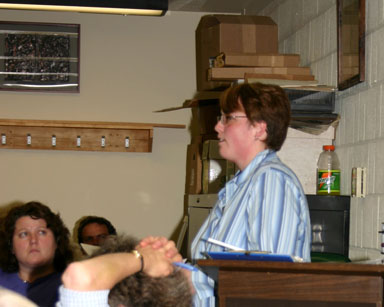
Recreation Coordinator Jennifer Glaab presents the June recreation report
Recreation Coordinator Jennifer Glaab opened her recreation report (155KB PDF) with lineup of summer concerts to be held in Montgomery Park (165KB PDF). This year will be eight consecutive weeks instead of two weeks per month, "with a couple of big names on the plate this year." They're also offering businesses the chance to co-sponsor these events, and the Dryden Recreation Commission will be providing concessions.
Glaab thanked Town Attorney Mahlon Perkins for creating a single contract for performers, and drafted a resolution authorizing the Town Supervisor or his designee to execute these contracts. The board passed it, minus the designee clause.
Glaab also noted the upcoming Wal-Mart All-American Kid's Fishing Derby, July 17th on Dryden Lake, and the summer travel baseball and softball teams.
Glaab reviewed past events, including the Sierra Mist Dribble, Pass, & Score soccer competition (154KB PDF), as well as the sectional competition for the Pepsi Pitch, Hit, & Run and the Duke Erickson Co-Ed Adult Softball League.
In reponse to the board's earlier criticism of the canoe rentals program, Glaab created a revised proposal (160KB PDF):
"I took out the purchase of any new equipment. This proposal just has the TC3 six canoes that they agreed to lend us. I also cut back the lifeguarding staff and hours, and cut back some of the purchases of the lifejackets. I actually cut back the rental charges. On the canoe rack... that could be a temporary. It'll be steel with PVC pipe on it... wide enough for two canoes side-by-side.... I can get that for $505."
Councilman Christofferson asked what the need was, noting that people often have their own canoes. Glaab said it was to help people who didn't have canoes or transportation for them, and reported that people last year had taken a lot of literature on it and been enthusiastic. It would also get people out on Dryden Lake. The Youth Commission has been interested in doing some day camps with the canoes as well.
Christofferson noted that they'd heard from the accountant that they had limited funds, and he was wondering how they could do all of that. Glaab pointed out that this cost less than the lacrosse programs Christofferson has championed, provoking some laughter.
Councilman Michaels preferred to have the canoes used for special events, but not to pay for a lifeguard on a regular basis when it wasn't clear people would be using the canoes. Michaels agreed that the program was a good idea, but didn't think the costs for continuous operation made sense. Glaab offered to incorporate special days in the program, but Michaels seemed more interested in one-day projects instead and asked for a smaller program with less staffing. Michaels wasn't happy with the costs per person served.
The last issue, the county's upcoming pullout from the Tompkins County Recreation Partnership, created the most sparks. The Town is a member of the Partnership and has to give fifteen months notice to leave. 556 town residents participated last year. Glaab presented some possible options for costs next year, which ranged from $11,449 to $14,311.
County Legislator Martha Robertson explained that the assessment formula varies by number of participants and total assessment. Glaab said that because of the 15-month notice, the Town would be facing one of these options. Glaab hoped that the Town would urge the County to continue its funding.
Chris Michaels was concerned that while he'd "rumblings", "most of the information he'd received seemed inaccurate or colored", and asked for more information at the July meeting on the number of users in the community.
Glaab pointed out a letter from Supervisor Don Barber of Caroline (272KB PDF) on the changes ahead and the possibilities they offer. Martha Robertson described the original negotiations that had created the Partnership as "brutal," and said that the county was still sorting out whether their staff support would be continued, at about 20% of full-time equivalent. The county will be presenting a list of what that staff support does.
Robertson said that the two main questions were how much of a subsidy the town would provide and how much staffing the town would provide. Michaels said the he understood the questions and didn't think renegotiating the contract made sense, but wanted details on what the town was getting out of it. He felt the town had been "wishy-washy" about its commitments. He also asked if this program mostly benefited the west end of the town, but Glaab said that it seemed to serve the whole town.
County Legislator Mike Lane suggested getting Nancy Zahler to discuss the history of the partnership, and noted the history's ties to the Ithaca City School District's sprawling size and inclusion of territory in places like Dryden.
Councilman Steve Stelick, who had been to a recent meeting on the future of the partnership, demanded change, saying that:
"While Dryden at the time was very interested and involved in getting in this, we have since changed in a lot of ways. We have our own Rec Department. We have a very active Rec Department that's moving forward. I stated at that meeting that and I state here tonight, that we do, at least I do, support the Rec Partnership at this time. I also stated in that meeting - Martha was there - that Dryden is no longer going to be a silent partner in that rec partnership. Previously it's been run by a very small group of people, and it's specifically Ithaca and the Ithaca Youth Bureau. We're not going to allow that. We're going to be interested in what programs get financed and there's a lot of other things.
"One thing you left out is probably the best-run program around here, the Town of Lansing's, and they are not involved in this Rec Partnership... Their Rec Director has stated that they're not going in this because of the way it is run. The fact that we feel there is a lot spent on bureaucracy.
"I'm going to be very involved in this personally, and I've talked with Jen about this at length. We want to take care of all the kids that are in the Town of Dryden. Whether it's Ithaca School District or Dryden School District, we want to get the best bang for our buck. I still think, in the end, the best way to do it is for the municipalities to run it with help from the Ithaca Youth Bureau, but - one vote. One vote, and we have say, not 'here. This is what you get.'
"We want real numbers. We want to pay for the programs. We don't want to pay for bureaucracy. I don't want to pay for eight layers of bureaucracy because it doesn't trickle down to the kids. I looked at the numbers. Specifically I remember soccer programs. Almost nothing got down there. They were paying for all the coaches. You come here to Dryden. You don't pay for the coaches. We have a Rec Director, we now have an intern for the summer. We depend on volunteerism and that's the way, listening to Don Barber, and in his letter, that's what we need to continue on with.
"I want to take care of every kid that wants to participate in the Town of Dryden. I think that we can do a better job by working with the Town of Lansing, by working with Don Barber in Caroline, with Ulysses, and doing it ourselves... together equally, instead of being this uneven."
Martha Robertson defended the "bang for the buck" of the program, pointing out that it provided a lot for an $11,000 investment and that the partnership looks at costs down to the nickel. In response, Freeville Village Clerk Patty Mooney said that she can't afford the County summer camp, and finds the Freeville summer camp a much better deal. No actions were taken, but this seems likely to be a big issue in the July meetings.
Neptune Hose Company Chief Ron Flynn asked that the Rec Department let fire departments know when they'll be holding events at Dryden Lake so they can make sure to have coverage.
(The Recreation Department's 2004 budget (552KB PDF) was also in the Recreation Report but wasn't discussed at the meeting.)
June 30, 2004
A quiet Our Towns
This week's Our Towns section in the Ithaca Journal focuses mostly on Groton, but there are a few pieces about Dryden. Kiwanis "Kids Against Drugs, Alcohol, and Tobacco" winners and a notice for the Dryden High School Class of '84 reunion are in Briefly in Dryden, while a notice about the Varna United Methodist Church's July 10th barbecue slips into Briefly in Groton.
The statistical sidebar announces that 49.94% of Dryden residents are male while 50.06% are female, a pretty even division.
The editorial in today's paper looks at private efforts to raise money for local government and schools, and notes the Dryden Youth Opportunity Fund. There's also a letter from Frank Palmer of Dryden expressing concern about the faltering county emergency radio system.
